|
|
|
Sort Order |
|
|
|
Items / Page
|
|
|
|
|
|
|
| Srl | Item |
| 1 |
ID:
090983
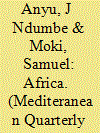

|
|
|
|
|
| Publication |
2009.
|
| Summary/Abstract |
The authors contend that the pervasiveness of piracy on the African coasts is threatening global security. Within Somalia, it is causing a disruption of food supplies, fostering internal conflict, and increasing the prices of basic commodities. Globally, it is orchestrating a dramatic rise in maritime insurance premiums and maritime insecurity, disrupting international commerce, increasing the possibility of an environmental disaster, and encouraging a nervous, emerging relationship with terrorism. Piracy must be stopped. To achieve this objective, the authors recommend revamping the international law on piracy, maintaining adequate coastal security along the hot spots on the African coasts, using military force, establishing safe maritime lanes, training crews on security measures, stationing armed guards on ships, and most importantly, reestablishing political stability in Somalia.
|
|
|
|
|
|
|
|
|
|
|
|
|
|
|
|
| 2 |
ID:
002113


|
|
|
|
|
| Publication |
Boulder, Westview Press, 1991.
|
| Description |
vi, 227p.
|
| Standard Number |
0813382785
|
|
|
|
|
|
|
|
|
|
|
|
Copies: C:1/I:0,R:0,Q:0
Circulation
| Accession# | Call# | Current Location | Status | Policy | Location |
| 033558 | 382.3/BER 033558 | Main | On Shelf | General | |
|
|
|
|
| 3 |
ID:
120026
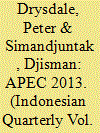

|
|
|
| 4 |
ID:
072203


|
|
|
|
|
| Publication |
Santa Monica, Rand Corporation, 1984.
|
| Description |
xi, 117p.
|
|
|
|
|
|
|
|
|
|
|
|
Copies: C:1/I:0,R:0,Q:0
Circulation
| Accession# | Call# | Current Location | Status | Policy | Location |
| 024657 | 382.0973052/ALE 024657 | Main | On Shelf | General | |
|
|
|
|
| 5 |
ID:
002205


|
|
|
|
|
| Publication |
Durham, Duke Univ., 1992.
|
| Description |
vi, 355p
|
| Standard Number |
0-8223-1186-0
|
|
|
|
|
|
|
|
|
|
|
|
Copies: C:1/I:0,R:0,Q:0
Circulation
| Accession# | Call# | Current Location | Status | Policy | Location |
| 033781 | 382.64/BER 033781 | Main | Withdrawn | General | |
|
|
|
|
| 6 |
ID:
140282
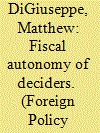

|
|
|
|
|
| Summary/Abstract |
Liberal theory claims that the constraint taxpayers impose on military expenditure is an important mechanism through which democracy and international commerce help prevent conflict. However, leaders with affordable access to sovereign credit have often overcome this constraint by raising revenue on credit markets. By minimizing or deferring the economic burden imposed on taxpayers and the macroeconomic stress associated with alternative financing strategies, I argue that these leaders have greater autonomy to pursue an aggressive foreign policy if they so desire. Leaders that lack creditor confidence risk increased political opposition and removal from office if hostilities generate macroeconomic stress or disturb the domestic fiscal balance. They also face a higher likelihood of defeat or retreat, and the subsequent political consequences, if they pursue conflict without sufficient resources. Estimates of a heteroskedastic probit model support this hypothesis and indicate that creditworthy states initiate conflict with a greater mean probability and greater variance than their noncreditworthy counterparts.
|
|
|
|
|
|
|
|
|
|
|
|
|
|
|
|
| 7 |
ID:
133393
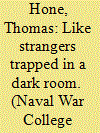

|
|
|
|
|
| Publication |
2013.
|
| Summary/Abstract |
This work begins in the early twentieth century, when Great Britain stood at the center of the first modern global economy. The dream of British free-trade liberals was coming true; world trade was expanding, and economists, financiers, and business leaders in many nations were working to eliminate tariff barriers and expand international trade and finance. Three things made this expansion possible. The large British steam-powered merchant marine, watched over by the Royal Navy, was making it possible for buyers and sellers of many goods to have confidence that products would be shipped on time. Second, as Nicholas Lambert observes in Planning Armageddon: British Economic Warfare and the First World War, the "huge explosion in international trade after 1870 was made possible largely by the development of the London credit market," which allowed vendors to ship goods to purchasers on the guarantee that payment had been made and would find its way through London to the vendors' banks. Third, the creation of reliable submarine cables allowed vendors, purchasers, and banks to communicate almost instantaneously across whole oceans, facilitating the various messages that in their turn made international commerce possible.
|
|
|
|
|
|
|
|
|
|
|
|
|
|
|
|
| 8 |
ID:
087576


|
|
|
|
|
| Publication |
2009.
|
| Summary/Abstract |
Democracies trade more with other democracies than they trade with closed political systems, but why they do so is unclear. We present a "gravity equation" that disentangles foreign policy from country-specific influences on trade by adding explanatory variables to control for traits of both the mass public and the domestic political system. We apply the resulting model to a data set covering 50 years (1948-1997) and 72 countries. The estimated effect of joint democracy, which appears in the absence of the country-specific variables, drops out when these control variables are added to eliminate omitted variable bias. Democracies do not trade together any more than they would incidentally given the usual social, economic, and political influences on commercial activity, calling into question explanations for their mutual trade activity that rely on foreign-policy favoritism or institutional compatibility.
|
|
|
|
|
|
|
|
|
|
|
|
|
|
|
|
| 9 |
ID:
138891
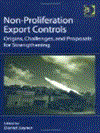

|
|
|
|
|
| Publication |
London, Ashgate, 2006.
|
| Description |
viii, 246p.Hbk
|
| Contents |
B
|
| Standard Number |
9780754644606
|
|
|
|
|
|
|
|
|
|
|
|
Copies: C:1/I:0,R:0,Q:0
Circulation
| Accession# | Call# | Current Location | Status | Policy | Location |
| 058236 | 382.456234/JOY 058236 | Main | On Shelf | General | |
|
|
|
|
| 10 |
ID:
076876


|
|
|
|
|
| Publication |
2007.
|
| Summary/Abstract |
The authors examine a standard gravity model of international commerce augmented to include political as well as institutional influences on bilateral trade. Using annual data from 1980-2001, they estimate regression coefficients and residual dependencies using a hierarchy of models in each year. Rather than gauge the generalizability of these patterns via traditional measures of statistical significance such as p-values, this article develops and employs a strategy to evaluate the out-of-sample predictive strength of various models. The analysis of recent international commerce shows that in addition to a typical gravity-model specification, political and institutional variables are important. The article also demonstrates that the often-reported link between international conflict and bilateral trade is elusive, and that inclusion of conflict in a trade model can sometimes lead to reduced out-of-sample predictive performance. Further, this article illustrates that there are substantial, persistent residual exporter- and importer-specific effects, and that ignoring such patterns in relational trade data results in an incomplete picture of international commerce, even in the context of a well-established framework such as the gravity model
|
|
|
|
|
|
|
|
|
|
|
|
|
|
|
|
| 11 |
ID:
128800
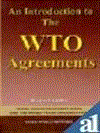

|
|
|
|
|
| Publication |
New Delhi, BookWell, 1999.
|
| Description |
xix, 452p.Hbk
|
| Standard Number |
8189640224
|
|
|
|
|
|
|
|
|
|
|
|
Copies: C:1/I:0,R:0,Q:0
Circulation
| Accession# | Call# | Current Location | Status | Policy | Location |
| 057625 | 382.92/DAS 057625 | Main | On Shelf | General | |
|
|
|
|
|
|
|
|
|